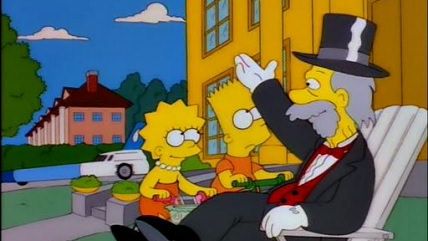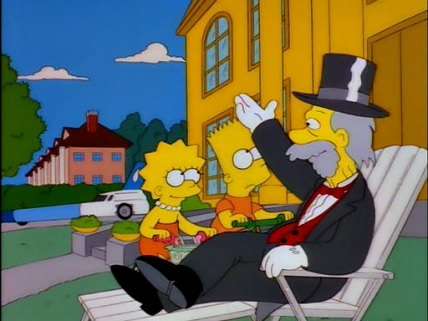Comedians Self-Regulate Joke Stealing


Over at Slate's "Humor Code" series, the latest entry asks, "who owns a joke?" and whether you can sue over a stolen joke. Peter McGraw and Joel Warner cover some of the history of joke-stealing, from Milton Berle's bit about why someone else would sleep with his wife that originated in a 4th century joke book to the stuff about Carlos Mencia.
The short answer is no one owns the idea of mocking something, so you can't really sue over a joke that's worded differently. And if you wanted to, it'd be expensive. The authors look at the work of two legal scholars, Dotan Oliar and Christopher Sprigman, who probed the recourse comedians had for joke theft in the wake of the Mencia dust-up in 2007 and uncovered an informal set of rules comedians followed:
Those who don't follow the rules can face escalating repercussions. First they're subjected to badmouthing; then they get blacklisted from clubs. Finally, if the unacceptable behavior continues, it's understood that things might get physical. While none of the comics Oliar and Sprigman interviewed admitted to participating in or witnessing fights over stolen jokes, many had heard stories, and they accepted such violence as a possible, if remote, outcome. As one comedian told the researchers, " … the only copyright protection you have is a quick uppercut."
Far from being dismayed by this extralegal system, [Dotan] Oliar and [Christopher] Sprigman came away impressed by the comedians' informal arrangement. "They have managed to put together a community project that requires a pretty high-level amount of group coordination," says Sprigman. It's a lot better than the joke-stealing free-for-all of Berle's era. And it's hard to imagine a more formal joke protection system, involving copyright filings and other legal procedures, working well in a world where comics are constantly generating and tweaking new material. In fact, Sprigman thinks this joke-stealing code could work for other industries struggling with how to balance creativity and copyright issues, including the music and tech industries. They should borrow it.
You don't need there to be a law, after all.
h/t invisible furry hand
Editor's Note: As of February 29, 2024, commenting privileges on reason.com posts are limited to Reason Plus subscribers. Past commenters are grandfathered in for a temporary period. Subscribe here to preserve your ability to comment. Your Reason Plus subscription also gives you an ad-free version of reason.com, along with full access to the digital edition and archives of Reason magazine. We request that comments be civil and on-topic. We do not moderate or assume any responsibility for comments, which are owned by the readers who post them. Comments do not represent the views of reason.com or Reason Foundation. We reserve the right to delete any comment and ban commenters for any reason at any time. Comments may only be edited within 5 minutes of posting. Report abuses.
Please to post comments


How can you prove you're the original owner of a joke? That would by my first line of defense if I were accused of joke theft. You have to be the copyright owner to sue, not a fellow thief.
I figure I'm as covered as I can get by freely admitting I make no claims to originality.
I just couldn't figure out how to fit it into a screen name.
I tell ya I get no respect, no respect! I go to see a shrink and he tells me I'm crazy. I say "What?! I'm not crazy I want a second opinion!"
He says, "You want a second opinion? You're ugly too!"
As I read the story I was reminded of a Dangerfield (I think it was Dangerfield) appearance on the Howard Stern Show, back when Jackie Martling was part of the cast.
IIRC, Martling had made the statement on various occasions that Dangerfield had "stolen a couple of jokes" from him. Dangerfield was pretty angry at the accusation and vehemently denied it.
Different than the material stealing that this article focuses on, the Dangerfield/Martling case was where Martling was writing jokes and trying to sell them. The way that works, IIRC again, is writer pens numerous jokes, then entertainers look them over and buy a few, rarely all, but they have seen all in that set. If they buy "these three" and use a fourth without paying, it is deemed stealing.
Made for an interesting show segment.
GMSM, he didn't say you were crazy, he said you were f-ing Goofy!
They have managed to put together a community project that requires a pretty high-level amount of group coordination
Leave it to Slate for managing to inject some kind of progressive/socialist spin into everything
Except their version of group coordination was perfected by Stalin and Mao. Effective groups need a leader you know.
Hat Tip to IFH?
Now we are a net exporter of h/ts to the damn Aussies?
CANCEL MY SUBSCRIPTION!
Since my first 2 issues arrived last Friday, I'm happy that I can now make this threat.
Should Aussies and Kiwis get the opposite of a hat tip? Since they live upside down, all a hat tip will lead to is them losing their hats.
Maybe they get a pants drop?
Its April Fools Day. There's no actual hat tip.
Cancel your own goddamn subscription! and feel free to burn every copy in your possession.
Oops, wrong blog 🙂
Did you hear about the peanut that went walking through a rough neighborhood at night?
He got assaulted!
For example, many jokes are derived from this medieval classic:
How many troubadors does it take to light a rush candle?
Three - one to get the rush stalk, another to put mutton grease and beeswax on it, and a third to sing about how Sir Lancelot and Guinevere made love in its light.
"Thus endeth the joke."
Man, that never gets old.
For example, many jokes are derived from this medieval classic:
How many troubadors does it take to light a rush candle?
Three - one to get the rush stalk, another to put mutton grease and beeswax on it, and a third to sing about how Sir Lancelot and Guinevere made love in its light.
You stole your own joke.
Then I can sue myself - I'm bound to win one way or the other!
Now that you have a monopoly on one joke you are automagically filthy rich!
In this situation, like so many others, only the lawyers truly win.
Man, that never gets old.
Tudor joke:
So two gentlemen meet on the street, and one of them says, "what do you think about the validity of King Henry VIII's marriage to Anne Boleyn?"
"Same as you," says the second man.
"Then I arrest you for treason in the name of the Privy Council!"
Too wordy.
"Finally, if the unacceptable behavior continues, it's understood that things might get physical."
COMEDIAN 1: "Why is a joke thief like a Weltanschauung?"
COMEDIAN 2: "I don't know, why?"
COMEDIAN 1: "They both have a welt!"
*smack* *biff* *pow*
"You don't need there to be a law, after all."
Right. Because an extremely small population like stand-up comedians existing in an insular world like comedy clubs is of course perfectly amenable to being scaled up to the much larger, more impersonal world that most copyright holders operate within.
"The Aristocrats!"
Wrecked 'im, damn near killed 'im.
It worked for well, over a hundred years on that larger scale in the publishing industry. So yes, it is scalable.
Well, the important thing is that nobody should think about whether there is an alternative to legislation, because God knows where that could lead.
"Knock knock."
"Who's there?"
"Obviously not the police, they would have simply broken your door down without knocking."
*blam**blam* "Warrent Service! Stop Resisting!" *Thwack*
*knock* *knock*
How come you park on a driveway and drive on a parkway?
I understand why an orange is called an orange, but why isn't a banana a yellow? And what the hell is up with gooseberries?
How many software engineers does it take to change a light bulb?
None. That's a hardware issue.
Racist.
I just worked out for the first time in over a year.
And boy are my arms tired.
I just flew in from Denver, and I'm stoned. Because I got some legal marijuana in Denver.
What's with people getting sick? I mean, what's the deal with cancer?
And what's the deal with Ovaltine?
You know what they should call Ovaltine? Nutella. Because the jar is oval in cross-section.
You don't need there to be a law, after all.
It sounds like they do need a law, and in fact have one. What they don't need is legislation.
Again I'm lefting wondering how mobs delivering beatings on a whim seems to be considered the ultimate in libertarianism.
If not for the state, mob beatings on a whim would be completely disorganized.
I know its hard for you to understand but, delivering beatings without the blessing of the Top Men is *not* the same as delivering them on a whim.
Yes, because that's obviously the only two options.
No, that's simply the option *you* implied with your post.
The *other* option is to have the Top Men deliver the beating on a whim.
Let's not forget, Mencia has no dick.
Flintsones = Honeymooners + Stone Age Cartoons
Honeymooners = Laurel & Hardy (according to Jackie Gleason)
Stone Age Cartoons = Gertie the Dinosaur + B.C.